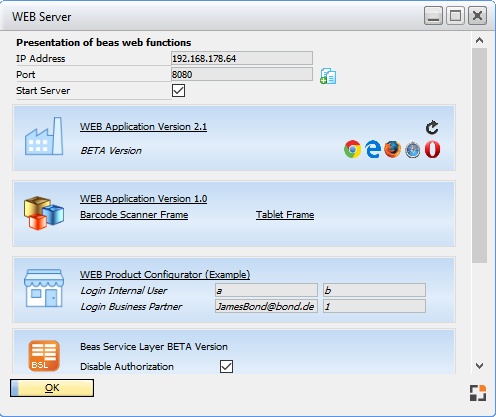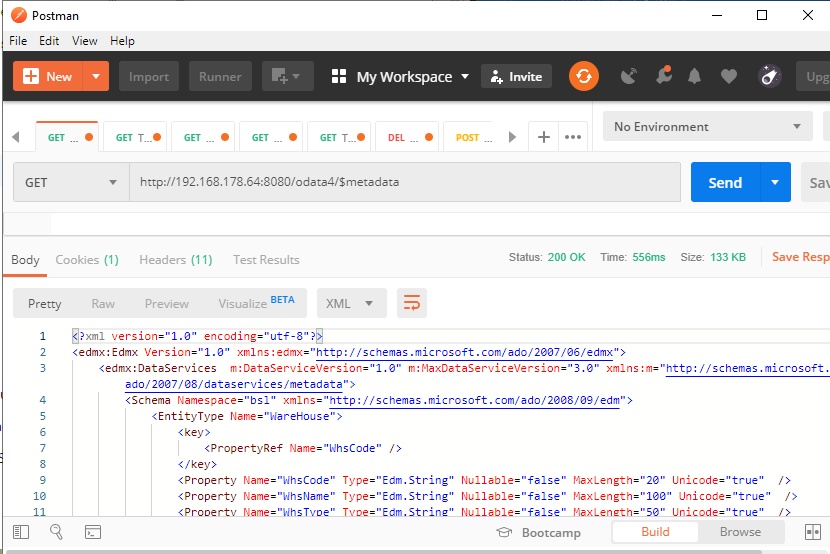BSL and Postman
The Beas Service Layer supports ODATA versions 2, 3 and 4 with limited compatibility. Some functions are not available, but additional functions help create applications.
Requirements
| • | Beas WEB Sever |
| • | Postman (or another tool) |
| • | Knowledge in using ODATA |
Process
| 1. | Start the Beas WEB Server in Beas Tools>WEB Server. |

| 2. | Activate "Disable Authorization" or see authorization. |
| 3. | Download and start Postman (https://www.getpostman.com/downloads/). |
| 4. | Insert the correct URL in Postman. |
![]()
Scheme: http
Host: The IP-Address, in this example: 192.168.178.64
Port: The Port, in this example: 8080
Service Root: Use odata2, odata3 or odata4
ResourcePath/Options: The resource and query options
| 5. | Test the connection (insert your IP/Port-Address) + "odata4" + the command, for example "$metadata": |

Examples using ODATA with the Beas Service Layer
Example |
Result |
Item(ItemCode="A001") |
Returns all fields from Item A001 |
Item("A001") |
Returns all fields from Item A001 |
Item("A001")/ItemName |
Returns only the ItemName in the defined format |
Item("A001")/ItemName/$value |
Returns only the ItemName in text format |
Item() |
Returns all fields for all items |
Item("A001")?$select=ItemCode,ItemName |
Returns the ItemCode and ItemName fields for item A001 |
Item("A001")?$select=ItemCode,ItemWareHouse&$expand=ItemWareHouse |
Returns all warehouse information as a sub-structure for item A001 {"ItemCode":"A001",ItemWareHouse:[ ] } |
Item("A001")?select=ItemCode,ItemWareHouse/WhsCode,ItemWareHouse/OnHand Difference: There is no $expand function inside the command, which makes this command ~20% faster per result line. |
Returns all warehouse information in a flat JSON file {"ItemCode":"A001","WhsCode":"01","OnHand":10.5}, |
Item("A001")?select=ItemCode,ItemWareHouse/WhsCode,ItemWareHouse/OnHand&$expand=ItemWareHouse&$format=jsonarray |
Returns all warehouse information in a flat JSON file ["A001","01",10.5],["A001","02",5.3] |
HTTP Header
From the client:
Keyword |
Description |
accept |
text/html application/xml, appication/xhtml+xml, xml application/json, json
Beas always uses the last defined format. In this example Beas uses the JSON format: accept=application/atom+xml,application/json
There is currently no metadata support |
accept-charset |
Not supported. Beas always uses udf-8. |
accept-encoding |
Not supported. |
accept-language |
Accepted language. Current only en-US is accepted. |
authorization |
Currently not supported. |
Cache-Control |
Beas does not work with a cache system in the ODATA protocol. |
